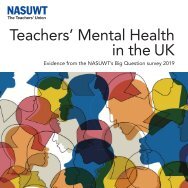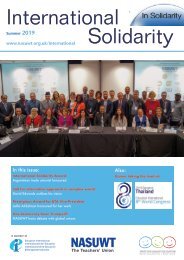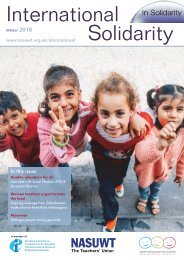International Solidarity Magazine (Spring 2020)
The NASUWT’s flagship international magazine highlighting the work of the NASUWT abroad and global education and human rights issues.
The NASUWT’s flagship international magazine highlighting the work of the NASUWT abroad and global education and human rights issues.
Create successful ePaper yourself
Turn your PDF publications into a flip-book with our unique Google optimized e-Paper software.
“Grants were being used to set up a small school, which was used by the community as well. This was a community reshaping
its future years of violence, almost a Shangri-La-type oasis amongst the immediate outside pressures of land
acquisition, poverty and violence which surrounded them.
“There is still a lot of violence in the country but here was a place which gave some hope to the future, especially for the
young families living there.”
Mr Kitchen said he found it upsetting to hear from victims of violence in the country, adding: “We heard stories of people
being shot in front of their families, of being disappeared; a woman told how she had been raped but also how important
she felt it was that her community needed to move forward.
“Throughout the week we became aware of the degree of violence and the number of people who had disappeared, and
the effect this has had on so many communities.”
Reflecting on his visit, Mr Kitchen said: “I was still shocked on hearing from the different groups the extent of the security
problems they were facing.
“The visit was an experience where your assumptions were challenged at every meeting, everyone was optimistic about
the future but realistic about the challenges.
“The journey taught me much about human nature and the importance of support and solidarity for the people of
Colombia.”
UNIONS CONDEMN VIOLENCE
AGAINST TEACHERS
During the visit to Colombia, the NASUWT and the
main education unions in the UK and Ireland
condemned the violence against Colombian teachers.
In a joint statement, NASUWT, UCU, INTO, EIS and
NEU, who between them represent one million
teachers and education staff, called on the Colombian
government to take “urgent measures” to tackle the
tide of violence against teachers and social activists,
including the implementation of the peace
agreement’s security provisions.
Despite the 2016 peace agreement, 13 teachers were
murdered in 2018, a year in which murders of
Colombian trade unionists more than doubled to 34
from 15 the previous year. More teachers were
murdered in 2019, and the human rights crisis has
continued into 2020.
The statement said: “We call on the Colombian
government to take urgent measures to tackle violence
against teachers and social activists, including the
implementation of the peace agreement’s security
provisions around dismantling armed groups and
establishing protective mechanisms in unstable
regions.
“Universal education is a basic human right which
benefits entire societies: attacks on teachers are
therefore an attack on everybody. We are proud to
stand alongside our Colombian colleagues in their
pursuit of a brighter future.”
Seperately, NASUWT Acting General Secretary Chris
Keates and Deputy General Secretary Dr Patrick Roach
expressed their solidarity to the General Secretary of
the education union FECODE.
In a letter, they said: “We are united with you in your
fight in defence of public education and protection for
your members.
“The NASUWT strongly rejects the practising of the
profession and trade unionism in an environment of
violence and withdrawal of human rights.
“Nobody should be threatened or killed simply for
organising and teaching.”
Meeting with leaders of FECODE. Many of them had
received death threats in the two weeks before we
arrived.
21






